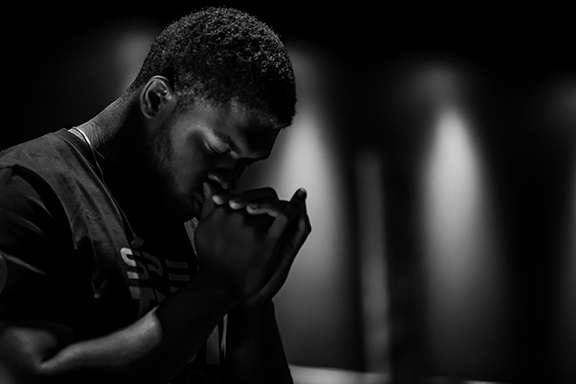The first meditation in a series on the national unrest and the call to prayer by Bishop Mark Lawrence
Early Saturday evening I was driving back from Summerville having just ordained one of our transitional deacons. Nearing Charleston, quite at the spur of the moment, I chose to take the Meeting Street off ramp. As I rounded the curve, the traffic was backed up in the way I would usually say to myself, “Darn I made a wrong choice.” Now I know it wasn’t a wrong choice. Protesters, most of them young, some black some white some brown, accompanied by several police officers were walking up the off ramp onto I-26. Some chanted, raised fists, or carried signs reading “I Can’t Breath” and “BLM” as they walked between the cars in front and behind me. Later Saturday evening the looting began and the helicopters were flying over the Charleston peninsula well into the wee hours of the morning. Charleston like many cities across the country was in travail.
The words in The Exhortation during the ordination of a deacon ring in my ears, “Furthermore, you are to interpret to the Church the needs, concerns and hopes of the world.” And elsewhere, “You…are to guide the intercessions of the Congregation….” Those words too ring in my ears. For as clergy are fond of saying, “Once a deacon always a deacon.” So even as a bishop my diaconal calling still grips me. It is now five days later, ten days after the cruel killing of George Floyd, and three months into this pandemic, and my spirit is still not at rest. It should not be. Tuesday morning I expressed my unrest to our Standing Committee and later to our diocesan staff. Some priests have asked me if I was going to be addressing our present crisis. “Bishop, we need to know what you think—we need to hear from you.” Frankly, I do not know what I think. I am still struggling to know what I feel. I suspect I am not alone.
I have resisted writing until now because I’m weary of reading and hearing words about this present crisis—this pandemic, quarantine, rising unemployment, racial injustice, violence, the Catch-22 of policing—and the rage and fear that dominate so many in our citizenry today. I cannot but believe many in the world too, like Eliza Doolittle in My Fair Lady, cry out “Words! Words! I’m so sick of words! Sing me no song! Read me no rhyme. Don’t waste my time. Show me!” Nevertheless, as a Christian I remind myself that I am not to grow weary of well doing in the midst of this or any other travail.
So let me turn to what I know. This convergence of sufferings is among other things a call to prayer. A cry—perhaps a howl—shared by all the creation for freedom from the havoc and corruption of sin. Moreover, it is equally a call for positive action from us who, in spite of our insufficiencies, are the aroma of Christ to God for our world. There are things we can do as individuals, as the Church, and as a nation. Former Secretary of State Condoleezza Rice in a recent op-ed wrote that while protests will take our country only so far, “The road to healing must begin with respectful but honest and deep conversations not judgements, about who we were, who we are and who we want to become.” Notice she wrote “begin” not end. Some of us who lived through the 60s and 70s have had those conversations. We may have had them in the 80s and 90s as well. Nevertheless, yesterday’s conversations are not sufficient for today. Whatever conversations long time members of the diocese have had in the past—and some of you will know—it is clearly time now for another today.
St. Paul writes that creation has been subjected to futility and is groaning to be set free from its bondage to corruption; it yearns for freedom like one groaning in the pains of childbirth. Therefore, we as believers also groan inwardly. Nevertheless, the apostle offers us the promise and hope that we are not in this alone. “Likewise the Spirit helps us in our weakness. For we do not know what to pray for as we ought, but the Spirit himself intercedes for us with groanings too deep for words.” (Romans 8:26) While some may interpret this as groanings for our individual struggles, and it certainly is, I believe it is also the groaning of the indwelling Spirit for our sisters and brothers around us. It is the Spirit’s call to prayer as well as a call to action; one we dare not resist, quench or grieve.
This is the first of several meditations I will be writing for those making this journey of prayer and fasting, a journey Archbishop Foley Beach has requested of our Province to undertake during this octave. Along with specific prayers, such as those the Archbishop referenced in his letter to the Church, may I also suggest that you allow yourself time to listen to the Holy Spirit’s groanings within you. Sometimes such groanings of the Spirit are not only too deep for words; it is also painful for us to allow ourselves to follow where it leads. Still, to walk in step with the Spirit is to walk with the Lord and Giver of life “… who will cause all things to work for good for those who love God and are called according to his purpose.” (Romans 8:28)

